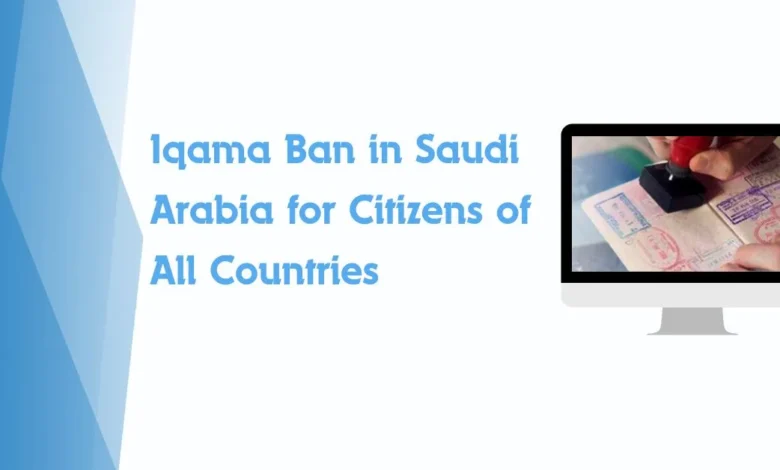Iqama Ban in Saudi Arabia for Citizens of All Countries

Iqama Ban in Saudi Arabia for Citizens of All Countries – Securing your Iqama is the most critical step to unlocking a stable and successful life in Saudi Arabia. This small card is far more than a residence permit; it is your key to legal employment, banking, healthcare, and family stability in the Kingdom. While the process is managed by your employer, understanding your role empowers you to ensure a smooth transition. From the initial job offer to the biometric appointment, this guide demystifies the journey, helping you navigate the requirements with confidence and start your new chapter on the right foot.
What is the Iqama?
The Iqama (إقامة) is an official residence and work permit issued by the Saudi Ministry of Interior to foreign nationals. It serves as your primary form of identification in the Kingdom and is essential for accessing daily services.
Key Functions of Your Iqama:
- Legal Proof: Confirms your legal right to reside and work for your specific sponsor.
- National ID: Acts as your official ID card for all transactions within Saudi Arabia.
- Service Access: Required to open a bank account, get a driver’s license, rent a property, enroll children in school, and use public healthcare.
The Prerequisites: Before You Apply
You cannot apply for an Iqama on your own. The process is initiated and managed by your Saudi employer (sponsor). Before an Iqama can be issued, you must have:
- A Valid Job Offer & Employment Contract: From a registered Saudi company.
- A Work Visa: Issued by a Saudi embassy/consulate based on your employer’s application.
- A Medical Examination: Conducted in your home country at an approved center.
The Step-by-Step Process After Arrival in Saudi Arabia
Once you enter the Kingdom with your work visa, your employer must secure your Iqama. The typical process is as follows:
| Step | Action | Responsible Party |
|---|---|---|
| 1 | Final Medical Check: Undergo a medical test at a government-approved health center in Saudi Arabia. | Employee |
| 2 | Biometric Enrollment: Visit a designated center to provide fingerprints and a photograph. | Employee |
| 3 | Sponsor Submits Application: Your employer submits all required documents and fees via the Ministry of Interior’s Absher platform. | Employer |
| 4 | Issuance: Once approved, your physical Iqama card is printed. This usually takes 2-3 weeks. | Ministry of Interior |
Required Documents
Your employer will typically handle the collection, but you should be prepared to provide:
- Original Passport (valid for at least 6 months)
- Passport-sized photos with a white background
- Copy of your work visa and entry stamp
- Attested educational and experience certificates
- Medical test results (from both home country and Saudi Arabia)
- Signed and attested employment contract
Fees, Validity, and Renewal
- Validity: The Iqama is typically valid for one year and must be renewed annually.
- Fees: The employer is legally responsible for paying the Iqama issuance and renewal fees (approximately SAR 650 – 800 per year), as well as providing health insurance.
- Renewal: Your employer should initiate the renewal process before the expiry date to avoid penalties. Delays can result in fines for both the employee and the employer.
Employer Responsibilities (Kafeel)
Saudi labor law places clear obligations on the sponsor (Kafeel). They are required to:
- Apply for the Iqama within 90 days of the employee’s arrival.
- Bear all costs related to the Iqama and work visa.
- Provide valid health insurance coverage.
- Renew the Iqama before its expiration.
- Facilitate the process for final exit or transfer of sponsorship.
Importance and Legal Penalties
Working or residing without a valid Iqama is a serious offense. Consequences include:
- Heavy fines (up to SAR 10,000).
- Detention and deportation.
- A ban on re-entering the Kingdom.
- Legal penalties and business license suspension for the employer.
Without a valid Iqama, you cannot:
- Legally work or receive your salary.
- Open a bank account or obtain a loan.
- Rent a house or apartment.
- Access government healthcare.
- Travel outside Saudi Arabia (as you need an exit/re-entry visa).
Key Tips for Expats
- Carry Your Iqama: Always have your original Iqama card with you, as authorities can request it at any time.
- Stay Informed: Keep track of your Iqama’s expiry date and follow up with your employer regarding renewal.
- Update Information: Inform your employer immediately if you renew your passport or have any changes in your personal details.
- Know Your Rights: Understand that your iqama is tied to your employer; you cannot work for anyone else without a formal transfer of sponsorship.
Conclusion
The Iqama is the cornerstone of an expatriate’s legal and practical life in Saudi Arabia. While the application and renewal process is the legal duty of your employer, being an informed and proactive employee is crucial for a hassle-free experience.
By understanding the requirements, timelines, and shared responsibilities outlined in this guide, you can ensure compliance, avoid penalties, and fully focus on building a rewarding career and life in the Kingdom. Remember, a valid iqama is not just a document; it is your guarantee of security and access to all that Saudi Arabia has to offer.
Frequently Asked Questions
What is an Iqama, and why is it so important?
The Iqama is Saudi Arabia’s official residence and work permit. It is your primary form of ID in the country and is legally required to open a bank account, rent a home, access healthcare, and even get a mobile phone plan. Without it, you cannot live or work legally.
How long is the Iqama valid, and what happens if it expires?
The Iqama is valid for one year and must be renewed by your employer before it expires. Allowing it to lapse can result in heavy fines (up to SAR 10,000) for both you and your employer, and potentially lead to deportation




